Colombian Peace Process
The Colombian peace process refers to the peace process between the Colombian government of President Juan Manuel Santos and the Revolutionary Armed Forces of Colombia – People’s Army (FARC–EP) to bring an end to the Colombian conflict. Negotiations began in September 2012, and mainly took place in Havana, Cuba. Negotiators announced a final agreement to end the conflict and build a lasting peace on August 24, 2016. However, a referendum to ratify the deal on October 2, 2016 was unsuccessful after 50.2% of voters voted against the agreement with 49.8% voting in favor. Afterward, the Colombian government and the FARC signed a revised peace deal on November 24 and sent it to Congress for ratification instead of conducting a second referendum.[1] Both houses of Congress ratified the revised peace accord on November 29-30, 2016, thus marking an end to the conflict.[2]
(wikipedia, for more information please visit the following link: https://en.wikipedia.org/wiki/Colombian_peace_process )
Peace in Colombia
It Is A Good Example For Syrian Leaders
Peace for All Syrians and For Humanity as A Whole
‘Last armed conflict in western hemisphere’
Colombian President Juan Manuel Santos and Farc leader Timoleon Jimenez, known as Timochenko, will sign an agreement at a ceremony on Monday, September 26, 2016
• From the section Latin America & Caribbean
https://www.bbc.com/news/video_and_audio/headlines/37469364
Colombia’s President Santos says Farc deal must rebuild country
• Media caption Juan Manuel Santos: “The signature of the deal is simply the end of the conflict then the hard work starts”
• Colombia’s President Juan Manuel Santos says peace with the Farc rebel group will boost economic growth and enable the country to rebuild its social fabric.
• “War is always more costly than peace,” he said in an interview with the BBC.
• Mr Santos and Farc leader Timoleon Jimenez, known as Timochenko, will sign a historic peace deal later on Monday.
• But it will take a long time for Colombian society to recover from more than five decades of conflict, he said.
Juan Manuel Santos the Signature of the deal is simply the end of the conflict then the hard work starts
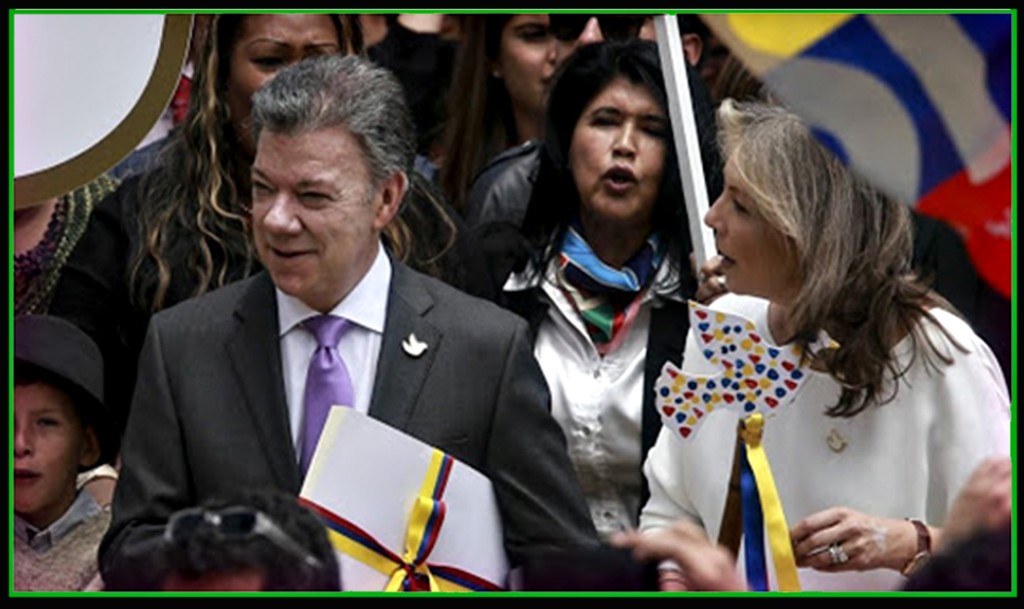 Colombia’s President Santos says Farc deal must rebuild country – BBC News (bbc.com)
Colombia’s President Santos says Farc deal must rebuild country – BBC News (bbc.com)
Mr Santos and Farc leader Timoleon Jimenez will sign the historic peace deal at a ceremony in the port city of Cartagena on Monday evening.
The document will be signed using a Baligrafo – a bullet turned into a pen – as a symbol of a peaceful future.
Some 2,500 attendees are expected, among them UN Secretary General Ban Ki-moon, US Secretary of State John Kerry and several Latin American leaders including Cuba’s Raul Castro.
Victims of the conflict will also be present.
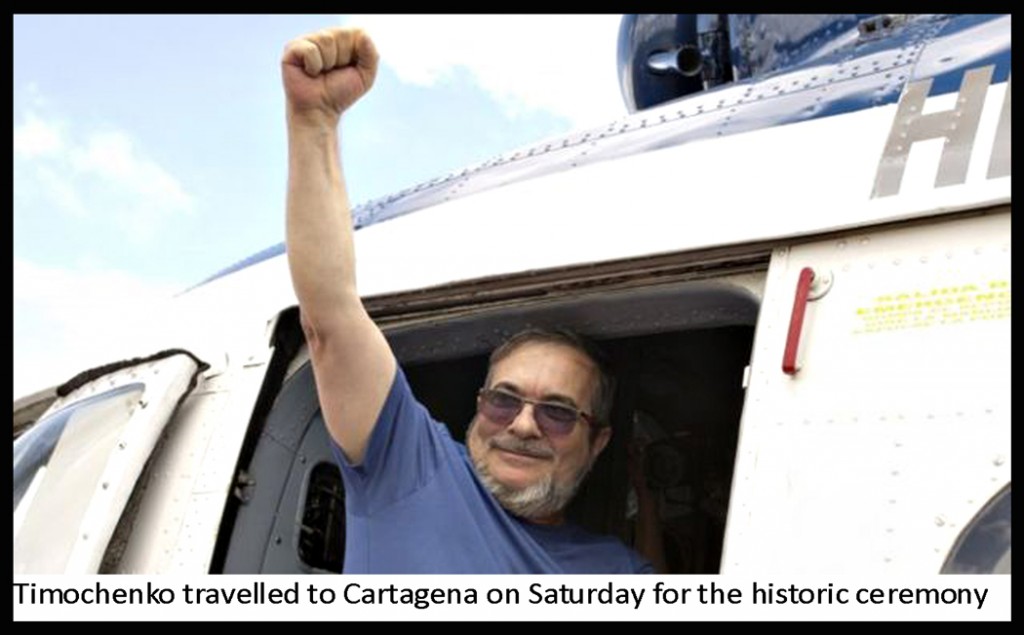 Timochenko travelled to Cartagena on Saturday for the historic ceremony
Timochenko travelled to Cartagena on Saturday for the historic ceremony
Image copyright AP Image caption
The Colombian government and left-wing Farc rebels have signed a historic agreement that formally brings an end to 52 years of armed conflict.
The rebel leader Timoleon Jimenez, known as Timochenko, apologised to “all the victims of the conflict” and was greeted by cheers and applause.
He said: “I would like to ask for forgiveness for all the pain that we have caused during this war.”
Guests dressed in white at the ceremony in Cartagena, to symbolise peace.
The last of the major Cold War conflicts killed 260,000 people and left more than six million internally displaced.
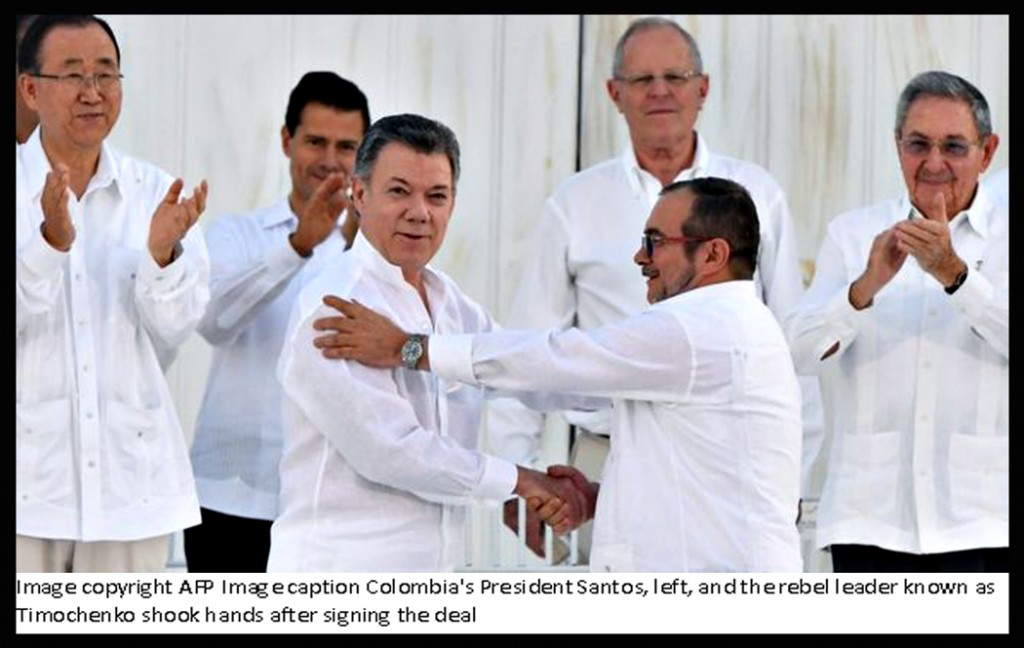 • Timochenko said the Farc, which began as the armed wing of the Communist Party in 1964, is leaving armed conflict behind and moving in to peaceful politics.
• Timochenko said the Farc, which began as the armed wing of the Communist Party in 1964, is leaving armed conflict behind and moving in to peaceful politics.
• “We are being reborn to launch a new era of reconciliation and of building peace,” he said.
• “Let us all be prepared to disarm our hearts.”
• The president and Timochenko used a pen made from a bullet to sign the deal.
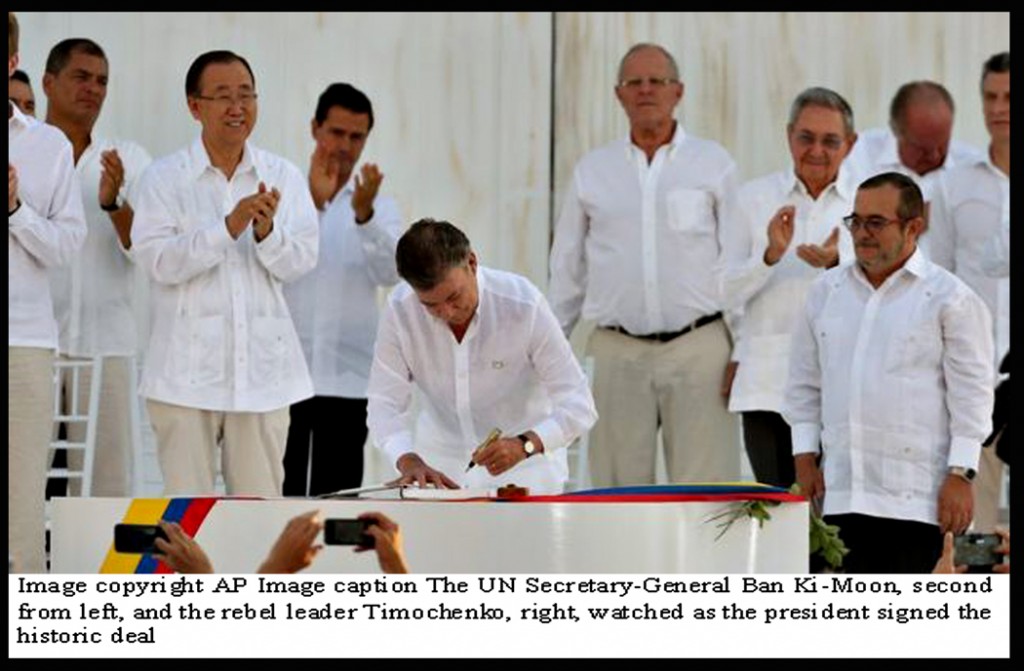 Analysis, by the BBC’s Lyse Doucet in Cartagena:
Analysis, by the BBC’s Lyse Doucet in Cartagena:
This was the first time Timochenko addressed the nation live on TV. He promised the Farc would give up its guns, and more than that, he asked for forgiveness.
It earned him a standing ovation. That would have been unthinkable not long ago.
But after 50 years of war, many Colombians still aren’t ready to forgive. As President Santos put it, the hard work of building peace now lies ahead.
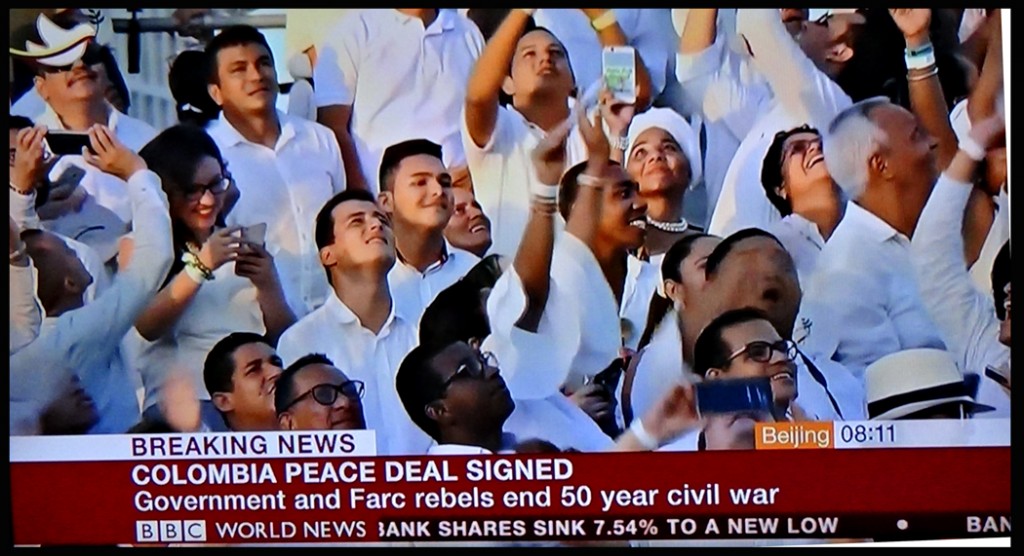 Analysis, by the BBC’s Lyse Doucet in Cartagena:
Analysis, by the BBC’s Lyse Doucet in Cartagena:
Under the deal, the Farc will be relaunched as a political party. Correspondents say that although there is widespread hope that the deal may bring an end to the kidnappings and bloodshed that have blighted Colombia over five decades, it has also led to divisions in Latin America’s fourth-biggest economy.
Some people are angry that it allows rebels to enter parliament without serving time in prison.
Correspondents say President Santos has risked his political future on the success of the peace deal.
 Analysis, by the BBC’s Lyse Doucet in Cartagena:
Analysis, by the BBC’s Lyse Doucet in Cartagena:
As Mr Kerry arrived in the country, he praised Mr Santos’ efforts to secure the deal and pledged $390m (£300m) to help implement it.
The US is not yet ready to remove the Farc from its list of terrorist organisations, he said, but is prepared to review that sanction once the peace agreement is up and running.
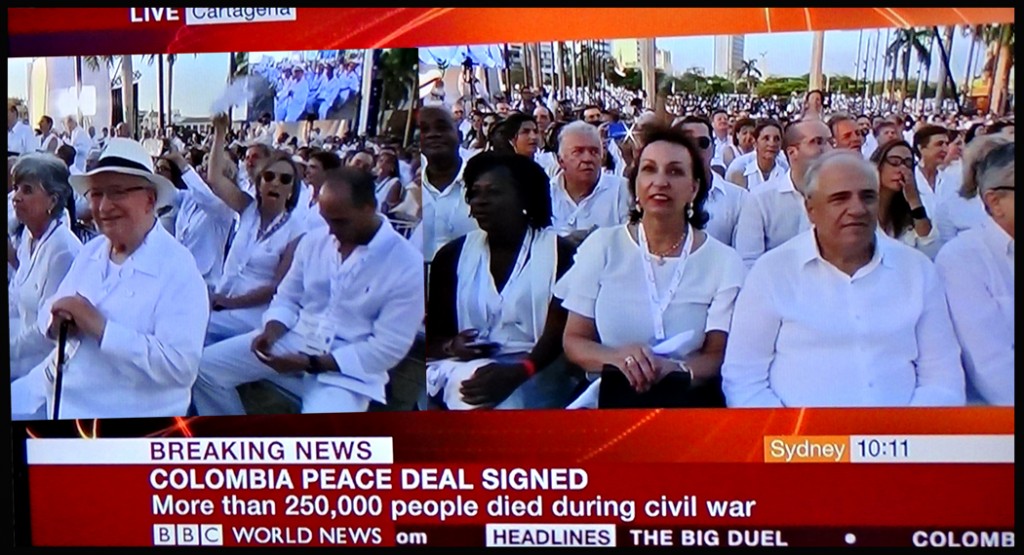 Farc rebels must now hand over weapons to the UN within 180 days.
Farc rebels must now hand over weapons to the UN within 180 days.
But the smaller ELN rebel group is still active, as are right-wing paramilitary groups.
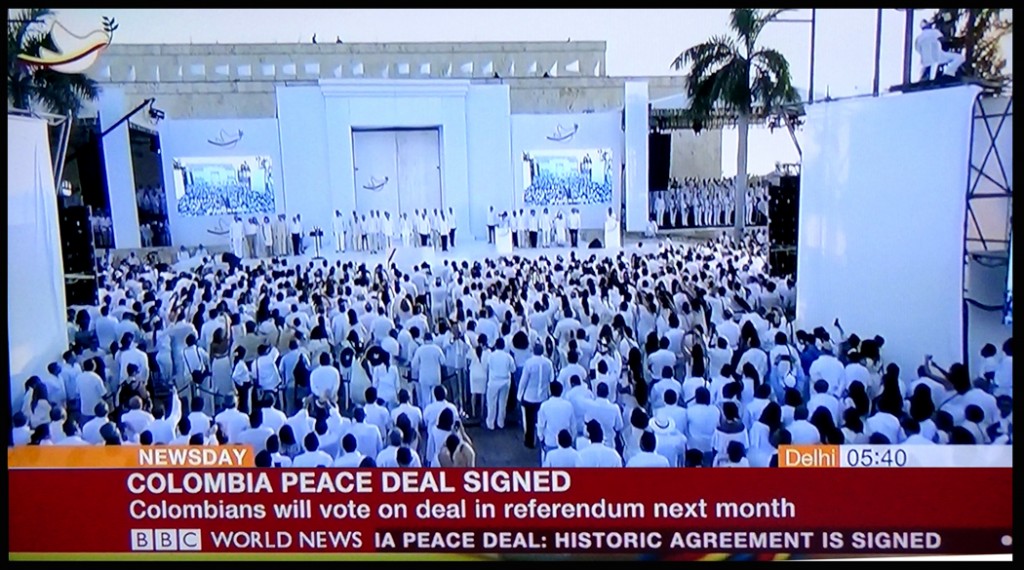 The Farc will be relaunched as a political party as part of the deal, which is due to be put to Colombian voters in a popular vote on 2 October.
The Farc will be relaunched as a political party as part of the deal, which is due to be put to Colombian voters in a popular vote on 2 October.
“We could have grown between 2% and 3% more per year for the past 23 years,” Mr Santos told the BBC’s Lyse Doucet, adding that the conflict had also had a profound impact on Colombian society.
“We have even lost our compassion, which is the ability to feel some kind of pain for others.
“A country at war for 50 years is a country that has destroyed many of its values,” said President Santos.
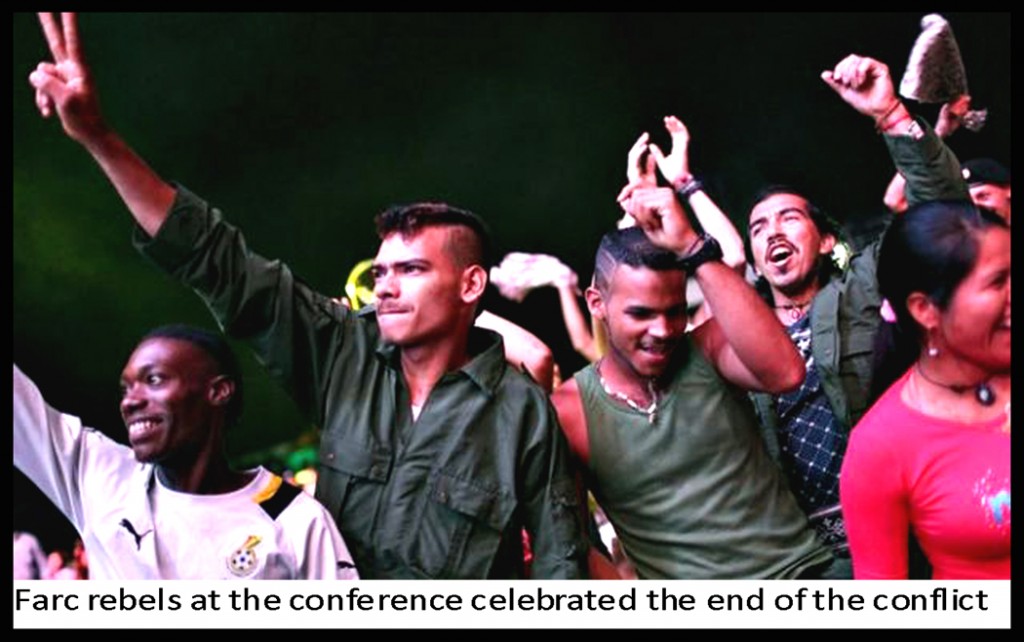 Mr Santos said he was “very, very confident” that most Colombians would vote in favour of the deal.
Mr Santos said he was “very, very confident” that most Colombians would vote in favour of the deal.
“The latest polls say that between 65% and 70% of the people approve of the peace process,” he said
But he warned that if the agreement was rejected in the popular vote, the conflict would start again.
Image copyright AFP Image caption “The people vote yes to peace,” reads an sign in Cartagena
“We will go back six years and continue the war with the Farc. That’s plan B,” he said.
Colombia’s second largest rebel group, the ELN (National Liberation Army), announced on Sunday a unilateral ceasefire until the referendum.
ELN leaders have publicly expressed their wish to engage in their own peace process with the Colombian government.
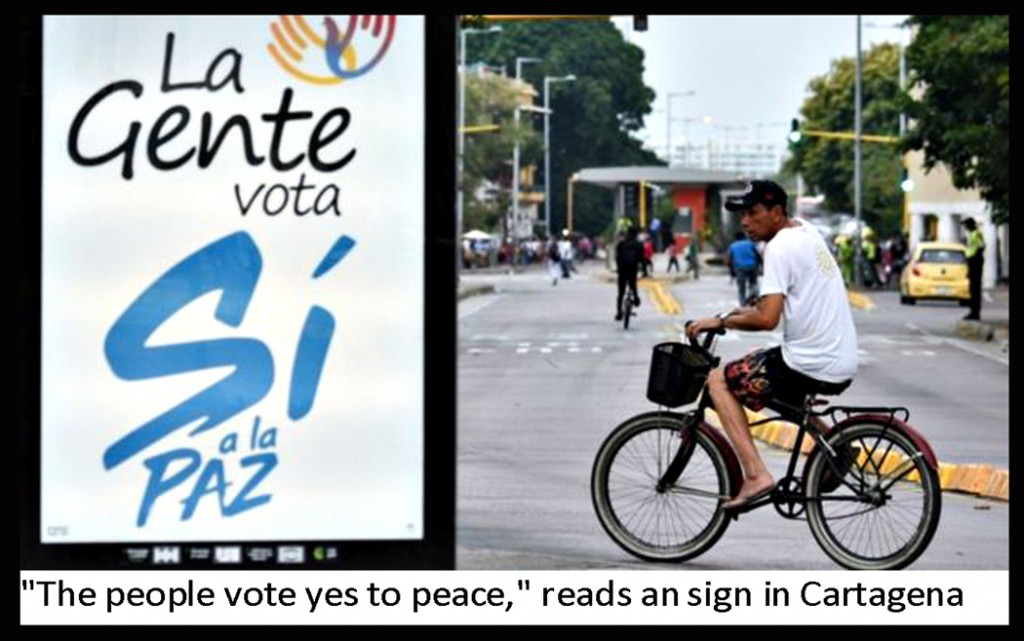 • President Juan Manuel Santos said: “Colombia celebrates, the planet celebrates because there is one less war in the world.
• President Juan Manuel Santos said: “Colombia celebrates, the planet celebrates because there is one less war in the world.
• We will achieve any goal, overcome any hurdle and turn our nation into a country we’ve always dreamed of – a country in peace.”
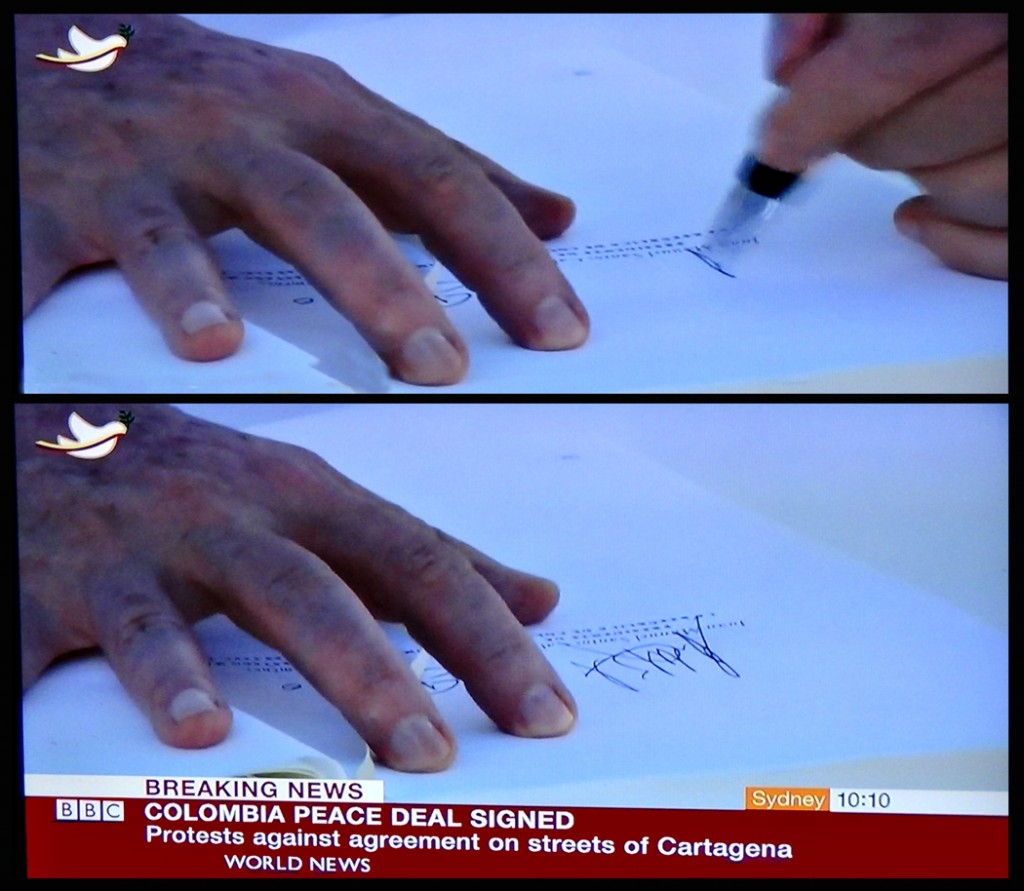 Analysis, by the BBC’s Lyse Doucet in Cartagena:
Analysis, by the BBC’s Lyse Doucet in Cartagena:
There was so much symbolism in this historic signing – a pen made from a bullet to sign the peace deal, the singing of Beethoven’s Ode to Joy, everyone dressed in white.
President Santos said this historic moment was a message from Colombia to the world: no more war. “No more war,” the crowd chanted in return.
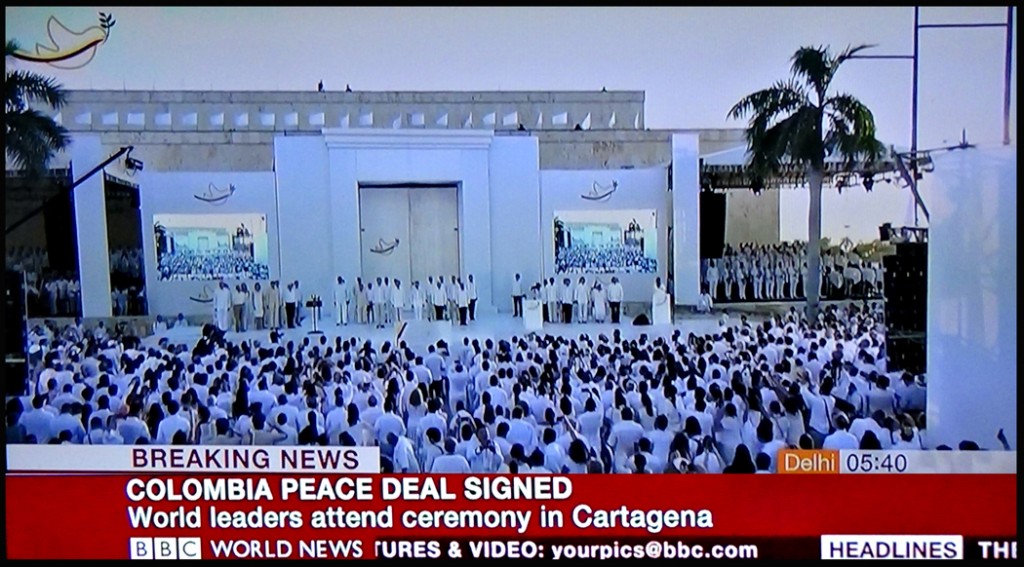 The deal comes after four years of talks in Havana, Cuba, between government and rebel negotiators. It must be approved by the Colombian people in a popular vote on Sunday before it can pass into law.
The deal comes after four years of talks in Havana, Cuba, between government and rebel negotiators. It must be approved by the Colombian people in a popular vote on Sunday before it can pass into law.
Polls indicate the majority of Colombians will vote for it, although there has been some opposition, led by ex-president Alvaro Uribe.
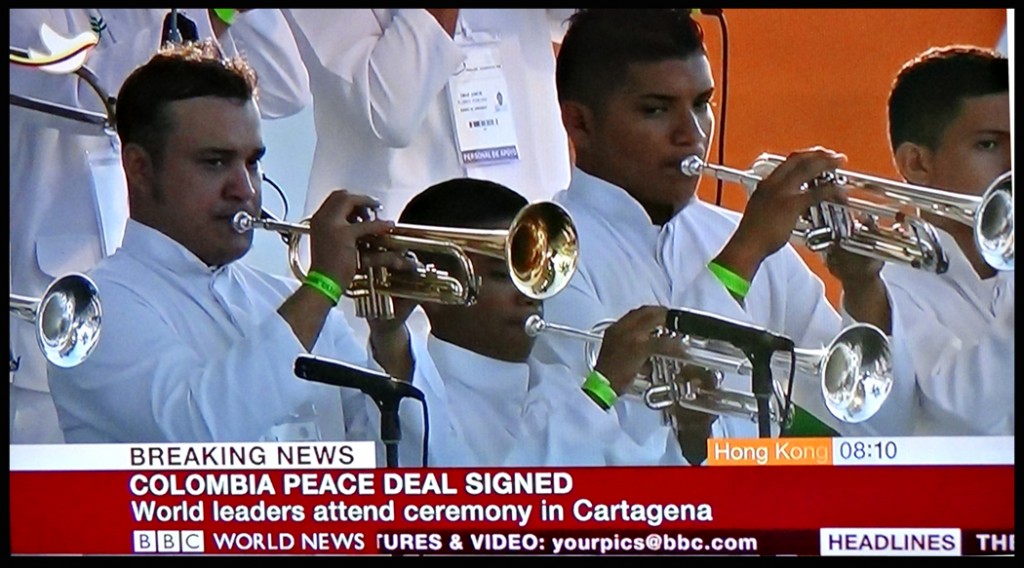 Dignitaries attending the ceremony included UN Secretary General Ban Ki-moon, US Secretary of State John Kerry and Cuban President Raul Castro.
Dignitaries attending the ceremony included UN Secretary General Ban Ki-moon, US Secretary of State John Kerry and Cuban President Raul Castro.
Mr Ban told the ceremony: “You can look to the future with optimism. You are inviting Colombians to live in peace.”
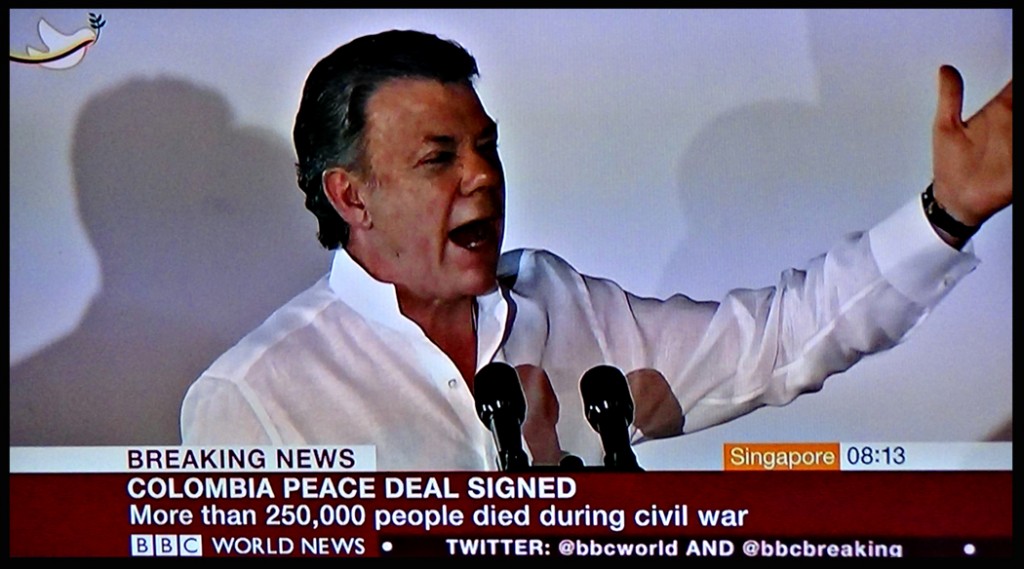 Correspondents say most Colombians are expected to support the deal – these supporters have made a sign of the Spanish word for “peace” Image But some people are opposed to it – demonstrations against the deal were held in Cartagena on Monday
Correspondents say most Colombians are expected to support the deal – these supporters have made a sign of the Spanish word for “peace” Image But some people are opposed to it – demonstrations against the deal were held in Cartagena on Monday
However, only hours before the signing, the EU announced it would suspend the Farc from its list.
“This decision will allow us to support the post-conflict programme and will be of benefit to all Colombians,” EU foreign policy chief Federica Mogherini said on social media.
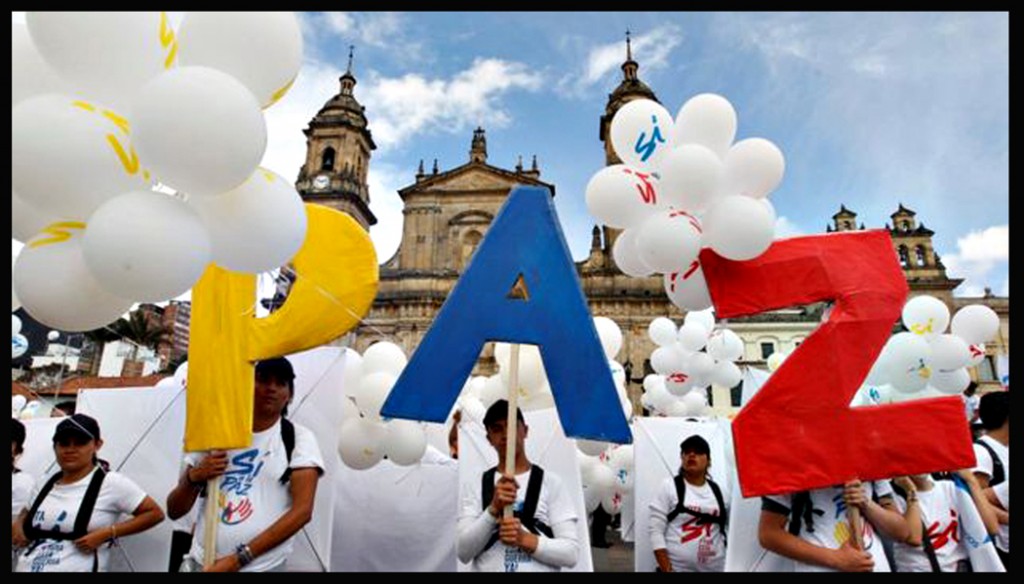 Colombia peace deal: Historic agreement is signed
Colombia peace deal: Historic agreement is signed
Analysis, by the BBC’s Lyse Doucet in Cartagena:
The Farc’s 52-year fight
Image copyright Reuters
1964: Set up as armed wing of Communist Party
2002: At its height, it had an army of 20,000 fighters controlling up to a third of the country. Senator Ingrid Betancourt kidnapped and held for six years along with 14 other hostages
2008: The Farc suffers a series of defeats in its worst year
2012: Start of peace talks in Havana
2016: Definitive ceasefire
• From the section Latin America & Caribbean
https://www.bbc.com/news/video_and_audio/headlines/37469364
For more information please visit the following link:
https://www.bbc.com/news/world-latin-america-37469149
Nobel Peace Prize For Colombia’s Juan Manuel Santos
• 7 October 2016
Colombian President Juan Manuel Santos has been awarded the Nobel Peace Prize for his efforts to end the 52-year conflict with left-wing rebels.
The Nobel committee praised him for a peace deal signed with Farc rebels, but rejected by Colombians in a vote.
Mr Santos said he dedicated the award to “all the victims of the conflict”, and the Farc leader congratulated him.
About 260,000 people have been killed and more than six million internally displaced in Colombia.
The award did not include Farc leader Rodrigo Londono, known as Timochenko, who also signed the accord.
• Who are the Farc?
• Colombia media hopeful over Santos peace prize
• Viewpoint: What next for Colombia?
• Santos: From hawk to dove
The head of the Nobel commitee said the award recognised the president’s “resolute efforts” to end the conflict.
“The award should also be seen as a tribute to the Colombian people who, despite great hardships and abuses, have not given up hope of a just peace, and to all the parties who have contributed to the peace process,” Kaci Kullman Five added.
For more information please visit the following link:
https://www.bbc.com/news/world-latin-america-37585188
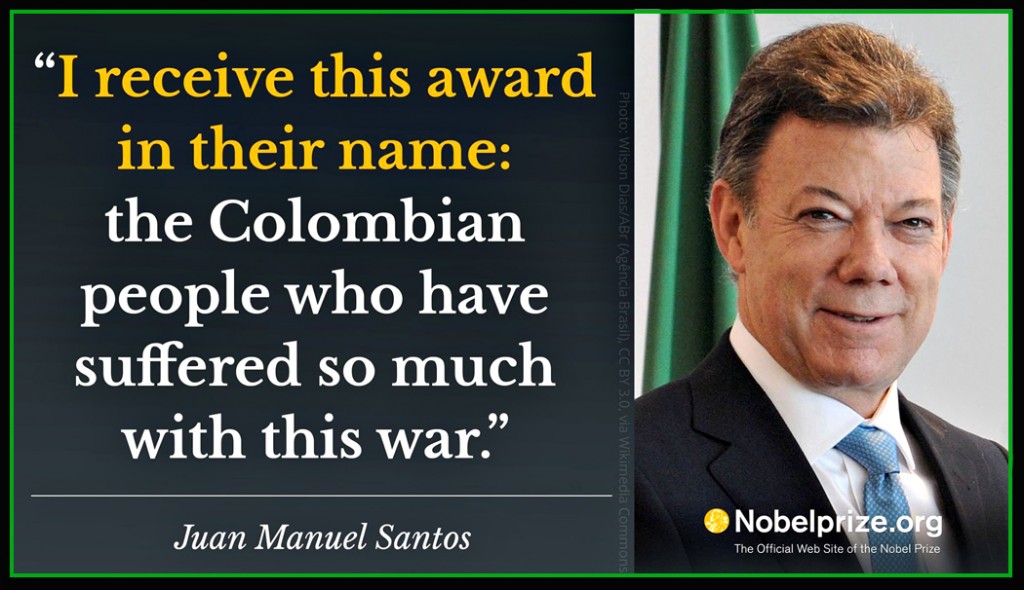 Nobel Peace Prize For Colom bia’s Juan Manuel Santos
Nobel Peace Prize For Colom bia’s Juan Manuel Santos
• 7 October 2016
• From the section Latin America & Caribbean
Juan Manuel Santo
• Born in Bogota in 10 August 1951 in an influential family
• Elected Colombian president in 2010 and re-elected in 2014
• Served as defence minister from 2006 until 2009
• Married, has two sons and one daughter
Sources: BBC Monitoring, Colombian presidency
For more information please visit the following link:
https://www.bbc.com/news/world-latin-america-37585188
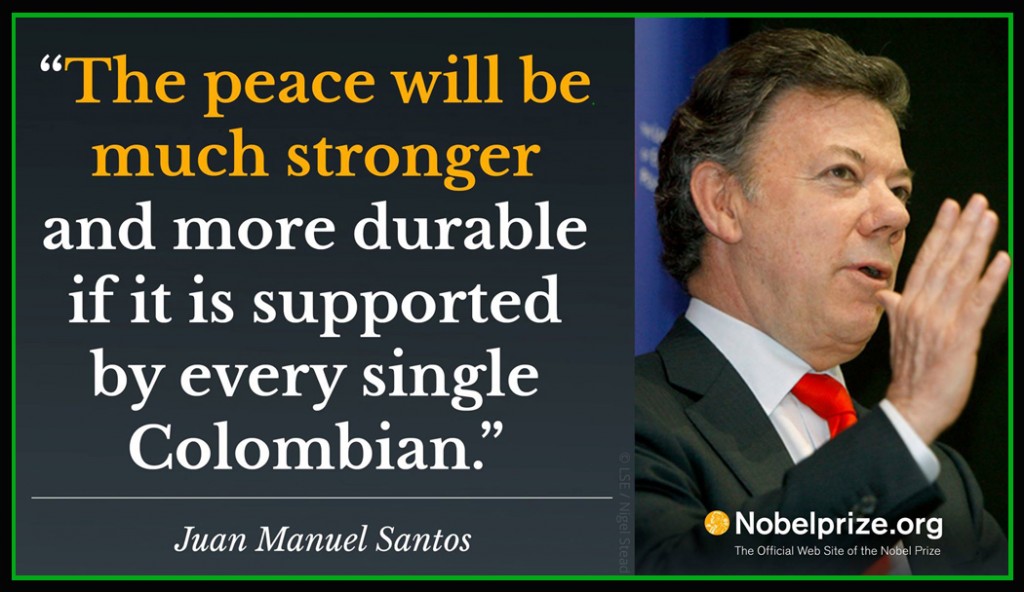
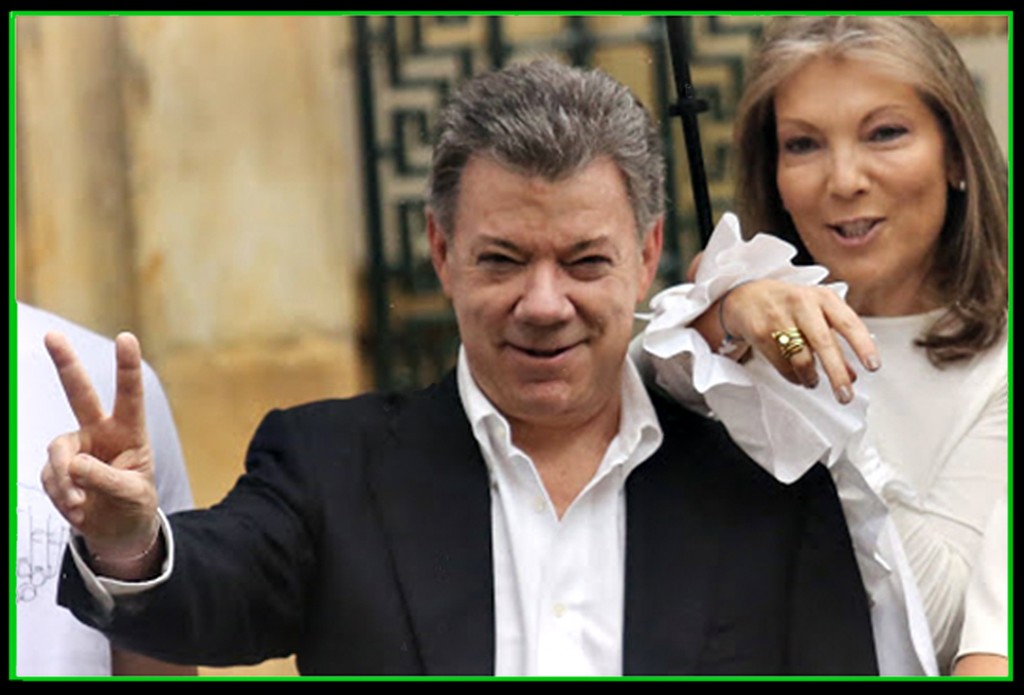 Colombian President Juan Manuel Santos and his wife, María Clemencia Rodríguez Múnera
Colombian President Juan Manuel Santos and his wife, María Clemencia Rodríguez Múnera
Colombia President Juan Manuel Santos awarded Nobel Peace Prize for bid to end half-century conflict
The award was a surprise because Colombians voted Sunday against Santos’s peace accord, which many viewed as too generous to the Revolutionary Armed Forces of Colombia (FARC). Santos was considered a leading candidate for the prize prior to the referendum, but his chances seemed to fade after voters sunk the deal by a narrow margin.
Offering a window into Nobel deliberations, the committee said its members were conscious that the Colombian peace efforts were imperiled and wanted to offer a boost.
“There is a real danger that the peace process will come to a halt and that civil war will flare up again,” said Kaci Kullmann Five, a former Norwegian politician who is now chair of the Norwegian Nobel Committee. “We hope it will encourage all good initiatives and all the parties who could make a difference in this process in Colombia.”
Juan Manuel Santos and his wife, he was recognized for his work to end a half-century conflict with Marxist rebels in his country.
For more information please visit the following link:
https://www.washingtonpost.com/world/colombia-president-juan-manuel-santos-awarded-nobel-peace-prize-for-efforts-to-bring-peace-to-his-nation/2016/10/07/c6e0d3c4-8a84-11e6-8cdc-4fbb1973b506_story.html
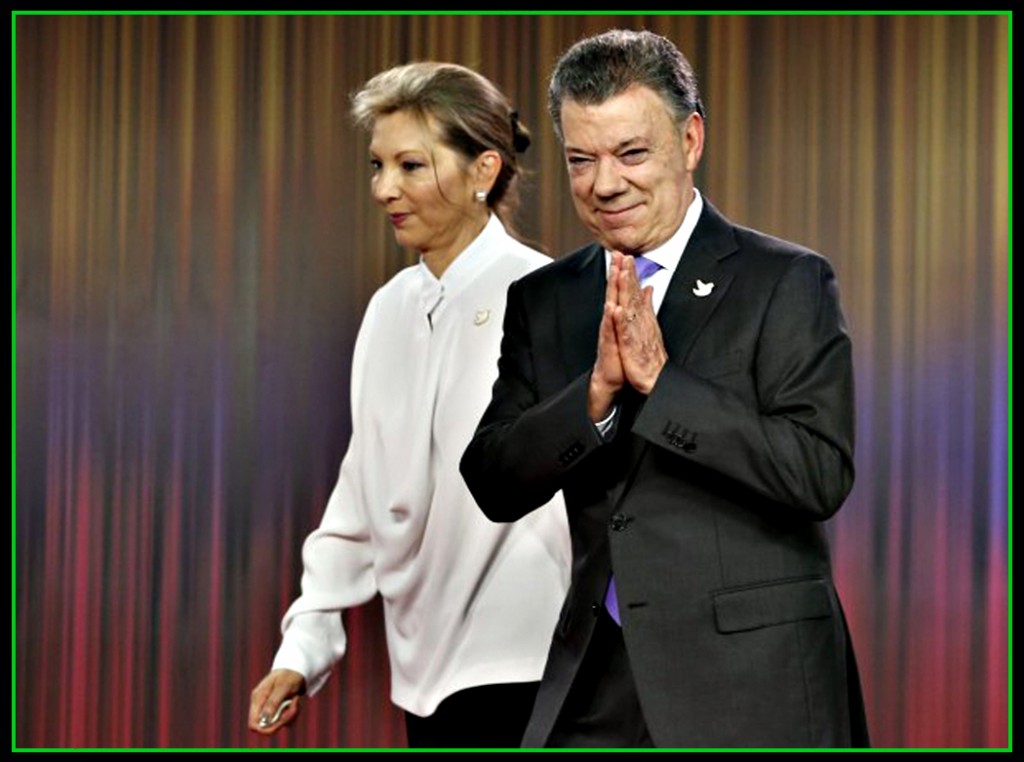 Colombia peace deal: Government and Farc reach new agreement
Colombia peace deal: Government and Farc reach new agreement
13 November 2016, from the section Latin America & Caribbean
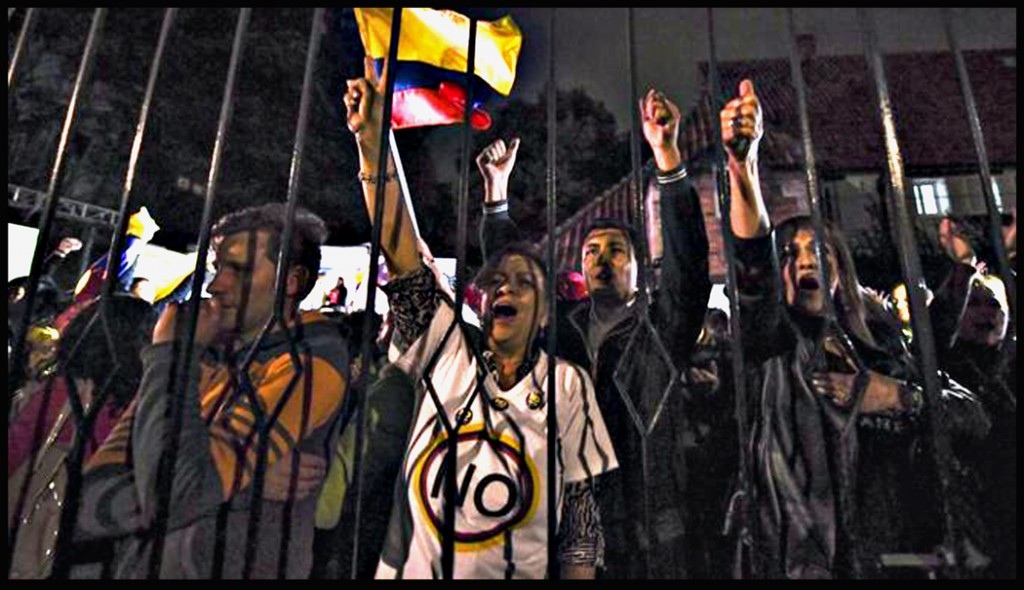 Image copyright GETTY IMAGES Image caption: The first peace deal met resistance as many claimed it allowed Farc rebels to get away with murder
Image copyright GETTY IMAGES Image caption: The first peace deal met resistance as many claimed it allowed Farc rebels to get away with murder
The Colombian government and the Farc rebel group have announced a new peace agreement, six weeks after the original deal was rejected in a popular vote.
The two sides, which have been holding talks in Cuba for four years, said the revised plan incorporated proposals from the opposition and others groups.
The initial deal had been deemed to be too favourable to the left-wing rebels.
The new agreement is not expected to be put to another popular vote, but rather submitted to Congress.
- Who are the Farc?
- What were the most contentious points?
- Who is Colombia’s leader Juan Manuel Santos?
“We have reached a new final agreement to end the armed conflict, which incorporates changes, clarifications and some new contributions from various social groups,” the two sides said in a statement.
It was read by diplomats from Cuba and Norway, the mediating countries, in the Cuban capital, Havana.
The statement did not give details of the revised agreement but Colombia’s lead negotiator, Humberto de la Calle, said it “resolves many criticisms” of the previous deal.
One new requirement was for the Farc to draw up a complete list of its assets, to be used for victim compensation, he added. Further details are expected to be released over the weekend.
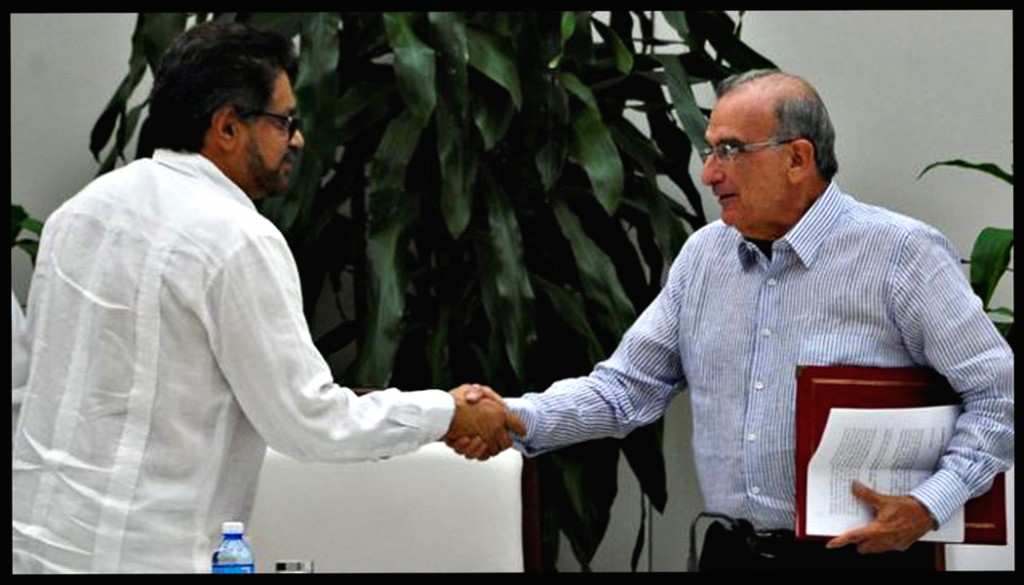 Image copyright GETTY IMAGES Image caption Farc representative Ivan Marquez (left) shook hands with government negotiator Humberto de la Calle
Image copyright GETTY IMAGES Image caption Farc representative Ivan Marquez (left) shook hands with government negotiator Humberto de la Calle
However the leader of the “No” campaign, former President Alvaro Uribe, said the new proposals did not go far enough.
The previous deal was rejected by 50.2% of voters in a vote held on 2 October.
Many objected to the lenient sentences given to fighters who confessed to crimes. Some would have avoided serving any time in conventional prisons.
Those who opposed the deal also balked at the government’s plan to pay demobilised Farc rebels a monthly stipend while offering those wanting to start a business financial help.
Polls had initially indicated that the agreement would be approved by a comfortable margin, but opposition to the agreement had been stronger than expected.
Despite the rejection of the deal by voters, President Juan Manuel Santos was awarded the Nobel Peace Prize for his part in the negotiations.
Colombia’s largest rebel group
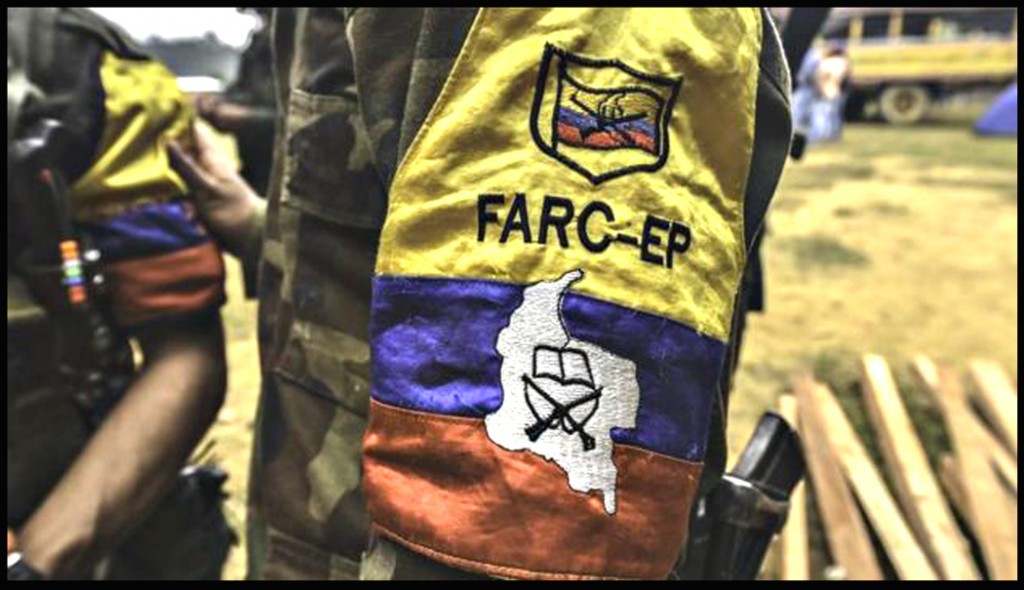 Image copyright GETTY IMAGES Image caption The Revolutionary Armed Forces of Colombia (Farc) was formed in 1964
Image copyright GETTY IMAGES Image caption The Revolutionary Armed Forces of Colombia (Farc) was formed in 1964
Farc, Colombia’s largest rebel group, was formed in 1964 with the stated intention of overthrowing the government and installing a Marxist regime.
After modest beginnings, the group rose to prominence through the 1980s and 1990s as its association with the drugs trade improved its financial standing.
At its peak it was the largest and best-equipped guerrilla force in Latin America.
But the number of active Farc fighters has diminished from its estimated high of 20,000 to about 7,000 after thousands of guerrilla fighters were demobilised or killed.
Colombia’s second-largest rebel group, the National Liberation Army (ELN), has also been engaged in an armed conflict for more than five decades.
About 260,000 people have killed and millions displaced in the 52-year conflict.
For more information please visit the following link: https://www.bbc.com/news/world-latin-america-37965392
“The Colombian government and left-wing Farc rebels have signed a historic agreement that formally brings an end to 52 years of armed conflict.
The last of the major Cold War conflicts killed 260,000 people and left more than six million internally displaced.”
“A Staggering New Death Toll for Syria’s War — 470,000” on FEBRUARY 11, 2016 report from FRONTLINE, PBS
For more information please visit the following link: https://www.pbs.org/wgbh/frontline/article/a-staggering-new-death-toll-for-syrias-war-470000/
Syria refugee crisis:
UPDATED JANUARY 31, 2017
- 13.5 million people in Syria need humanitarian assistance due to a violent civil war that began in 2011.
- 4.9 million Syrians are refugees, and 6.1 million are displaced within Syria; half of those affected are children.
- Children affected by the Syrian conflict are at risk of becoming ill, malnourished, abused, or exploited. Millions have been forced to quit school. View these photos to see life through the eyes of Syrian refugee children.
- Most Syrian refugees remain in the Middle East, in Turkey, Lebanon, Jordan, Iraq, and Egypt; slightly more than 10 percent of the refugees have fled to Europe.
- Peace negotiations continue despite a fraying and piecemeal ceasefire.
For more information please visit www.worldvision.org
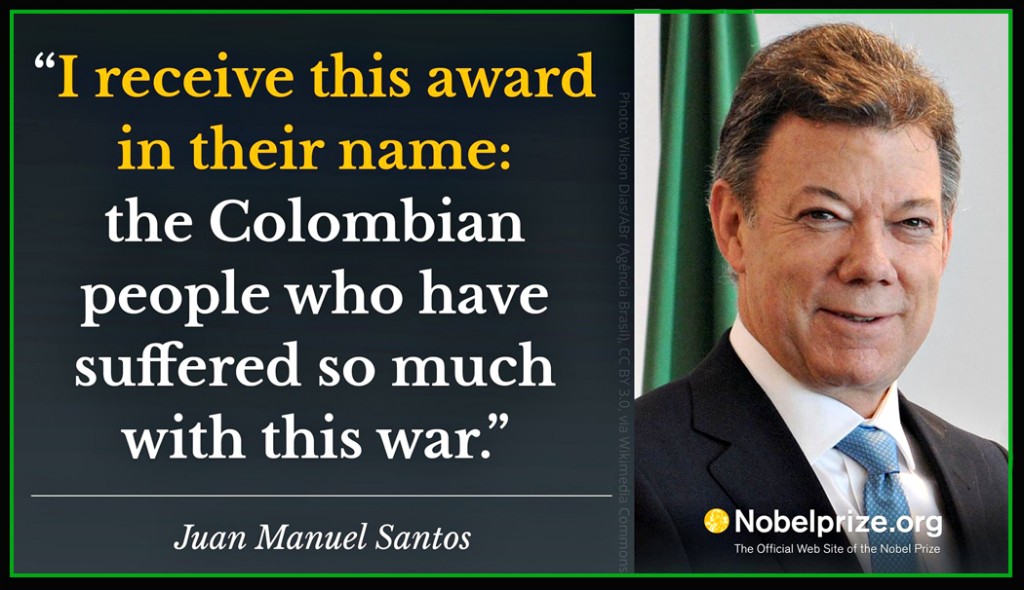
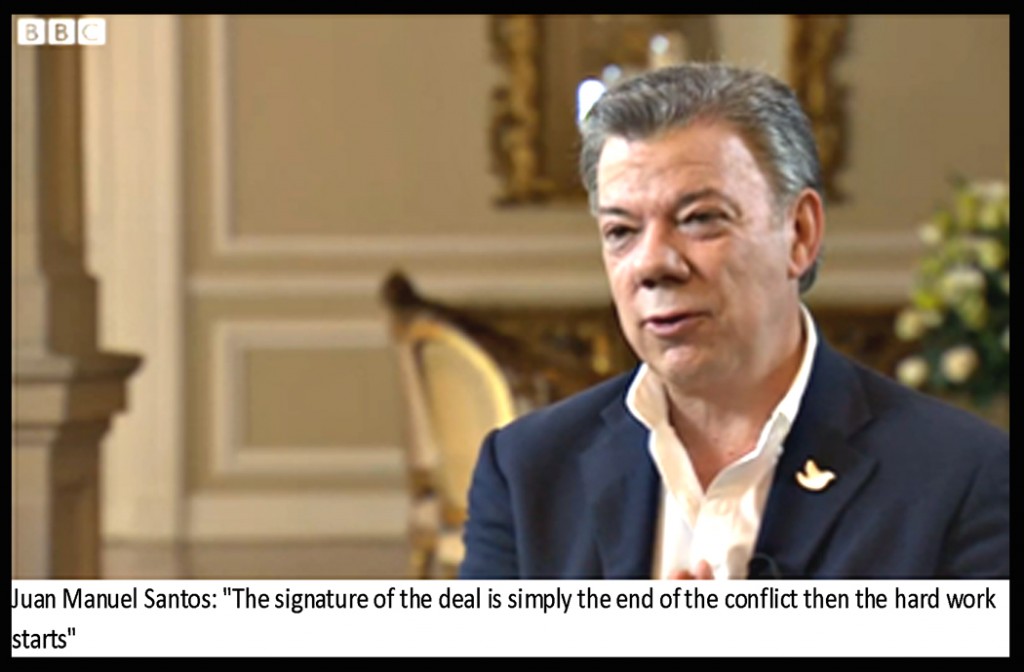
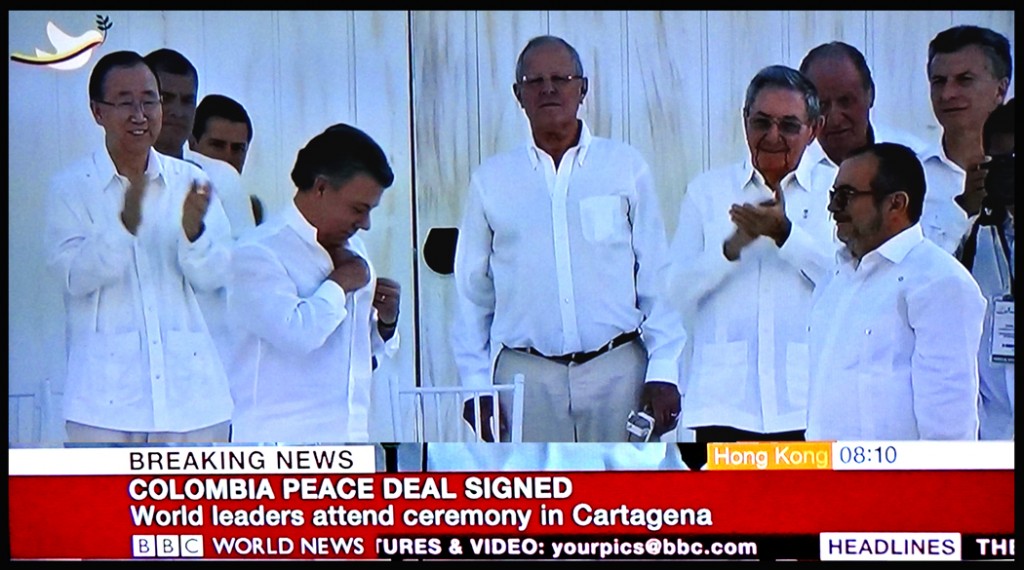
Leave a Reply